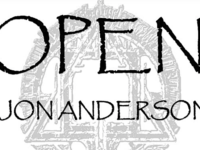“Silent Talking,” like much of 1991’s Union, sounds like Yes at first. The song has a contemporary feel with drums tuned tight, and everything is tied in with a bass sound which is low and distorted. The guitar jumps out of the speakers with its precise progressive chords. The bed of keyboards and synthesizer effects, however, don’t sound like anything Rick Wakeman would do.
By the time Jon Anderson enters with his vocals a third of the way in the song, “Silent Talking” has swerved off into the overproduction lane – and the discrepancies from a Yes song become more apparent. The backing vocals are simply overdone. Anderson, who is in fine voice the entire album, doesn’t have Chris Squire’s vocal presence on “Silent Talking.” Instead, an army of no less than seven backing vocalists provide too much of their considerable talents to the album and on this song, diluting Anderson’s presence.
Original Yes drummer Bill Bruford again seems to suffer from the production, as his playing seems so resequenced that the life is squeezed out of it. Bassist Tony Levin, Bruford’s subsequent bandmate in King Crimson, also seems restrained instead of inspired. Musically, only guitarist Jimmy Haun – who plays a majority of the guitars, with the exception of a few riffs which were retained from Steve Howe’s performance – stands out from the fray.
“Silent Talking,” a writing collaboration between the Yes offshoot band Anderson Bruford Wakeman Howe and producer Jonathan Elias, ultimately becomes another example of a good Union song torpedoed by questionable production decisions.
- The Blackbyrds – ‘City Life’ (1975; 2025 reissue) - June 9, 2025
- Fernando Perdomo – ‘Waves 6’ (2025) - June 8, 2025
- Thelonious Monk – ‘Thelonious Himself’ (1957; 2025 vinyl reissue) - May 26, 2025



